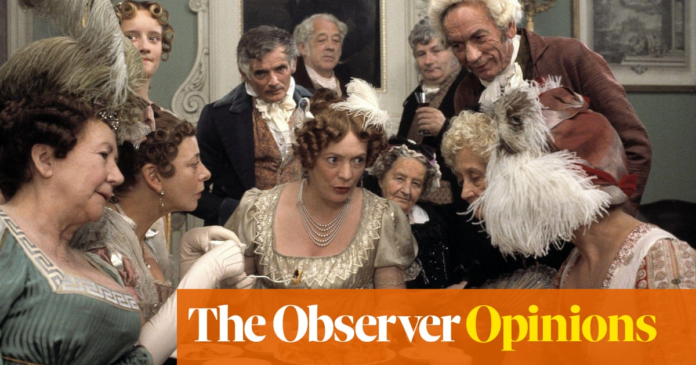Please bookmark for future updates
Plots and sprigged muslin aside, the author’s enduring legacy also lies in her relevance as a foil for modern mores
For some, it will be enough merely to re-read Persuasion, and thence to cry yet again at Captain Wentworth’s declaration of utmost love for Anne Elliot. But during the many and various celebrations in 2025 that will mark the 250th anniversary of the birth of Jane Austen, others, it seems, are planning to take a rather more full-hearted approach. Be warned: there will be breeches.
In Bath, where Austen took up residence in 1801, a series of costume balls are to be staged, one with a seaside theme inspired by the uncompleted Sanditon. At Chawton in Hampshire, where she lived with her mother and sister Cassandra from 1809, festivals will be devoted to Pride and Prejudice, Sense and Sensibility and Emma, the latter to include a Dress Up Day, should you happen to have a sprigged muslin gown hanging at the back of your wardrobe.
Austen died in Winchester in 1817, and by September a lifesize statue of the writer by the sculptor Martin Jennings will be installed in front of the city’s cathedral. It is reputed to have cost £100,000. Less expensive by far is the Regency ball that will be held in the cathedral’s nave in May, at which the Warleggan Village Band will play the music of the 18th century on fretted strings and an English concertina.
A full quarter millennium after her birth, Austen’s astonishing popularity shows no sign of waning: books, films, TV series and stage shows inspired either by her half dozen novels, or by the scant details of her life, arrive every year without fail – a distinction that sets her a world apart from her peers. Who, after all, is inclined now to turn to Charles Lamb’s essays, or even his Tales from Shakespeare?
Students of English literature may still read The Monk, Matthew Lewis’s Gothic novel of 1796, but only because it’s precisely the kind of silly, sensationalist volume Austen sends up so well in Northanger Abbey.
Her books may be peopled with clergymen; her notion of the gravest transgression may be an elopement or – even worse, perhaps – the humiliation of a kind but loquacious spinster. But her modernity is for us not in doubt. She’s ours: so acerbic, so wise, so unfathomably good and true.
What’s her secret? Why this soaring endurance? Certainly, she writes what we might call romantic comedies: her novels are about fine young people getting married, having overcome some foil or distraction, usually in the form of a person who’s unsuitable, against a delicious backdrop of interfering parents, aunts and other guardians (a clear line may be traced from Austen’s pitch-perfect minor characters to the British TV sitcom). But enjoyable as her plots are, there’s more to it than these.
In 1975, the bicentenary of her birth, Martin Amis wrote in the Observer of how the journey towards wedlock in Austen favours self-improvement over self-discovery; each protagonist must turn into the sort of person whom the other deserves to marry. Fifty years on, self-discovery of a certain kind having since become horribly central to our culture, perhaps her rather bracing view of relationships appeals to us more than we know, filling a gap we may struggle to articulate, or even to identify.
Sign up to Observed
Analysis and opinion on the week’s news and culture brought to you by the best Observer writers
after newsletter promotion
The hallmark of our age is emotional incontinence. Nothing is held back; our individual wants and needs are paramount. The pathos of Austen’s prose, however, is derived almost entirely from her characters’ adherence to convention, and thus to self-sacrifice. In their reticence and restraint, we find a well of emotion that’s all the deeper for being so quiet and constrained: a profundity that returns us ultimately to what’s important, which is not ourselves, but other people – whether we love them, or not.
Create an account
Welcome! Register for an account
A password will be e-mailed to you.
Password recovery
Recover your password
A password will be e-mailed to you.
Tuesday, December 31, 2024



